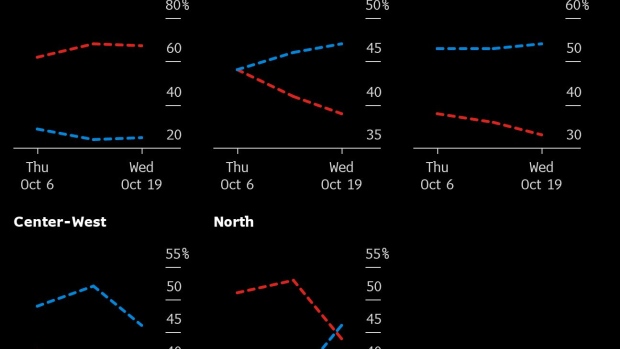Oct 19, 2022
Bolsonaro Cuts Into Lula’s Lead Ahead of Brazil Runoff
, Bloomberg News

(Bloomberg) -- President Jair Bolsonaro is chipping away at Luiz Inacio Lula da Silva’s lead in opinion polls with just 11 days to go until Brazil’s runoff election.
The leftist challenger saw his advantage over Bolsonaro narrow to 5.6 percentage points in a Quaest poll published Wednesday, from nearly 8 points two weeks ago. A Datafolha survey released later in the day showed Lula’s lead tightening by 2 percentage points in a period of four days.
And an Ipespe poll from Tuesday had the candidates statistically tied, though both moved within the poll’s margin of error.
The former president, who failed to win an outright majority of the votes in a first round earlier this month, is losing ground in four of Brazil’s five regions. The drop is particularly visible in the Southeast, home to more than 40% of the nation’s electorate, Quaest showed. His support is also wavering among middle-class voters, who have benefited the most from a recent drop in fuel prices.
Lula’s campaign is underestimating the impact of a recent improvement in the economy, as well as the strength of an anti-Workers’ Party sentiment, according to Thomas Traumann, a political consultant who served as communications minister under former President Dilma Rousseff.
Lula or Bolsonaro: Who’s Backing Who in Brazil’s Election Runoff
“Despite the backing of several center-right leaders, Lula’s campaign has remained too focused on the Workers’ Party agenda,” Traumann said in an interview. “That support hasn’t translated into a broader agenda.”
Fake-News War
The tighter race is also turning up the heat on Lula’s marketing advisers, who have focused campaign efforts mostly on boosting Bolsonaro’s rejection and less on making nods to centrist voters.
Since the first round on Oct. 2, both candidates had to contend with a barrage of wild social media posts trying to associate them with Satanism, Freemasonry, cannibalism and pedophilia -- an indication that at least part of Lula’s supporters are resorting to the very same tools, including the spread of fake news, traditionally adopted by Bolsonaro’s camp.
Satanism, Freemasonry Become Election Topics in Religious Brazil
In TV ads, the former president’s campaign widely reproduced a video in which Bolsonaro talks about a visit to a group of “very pretty 14- or 15-year-old” Venezuelan migrants in a poor Brasilia neighborhood, apparently suggesting they were prostitutes.
So large was the backlash that Bolsonaro was forced to address the issue, saying his words had been “taken out of context in bad faith.”
The reaction to the video was cited by one of Lula’s advisers to justify the decision to focus on increasing the incumbent’s rejection rate. At this point, the campaign is more concerned about abstention rates, which tend to favor Bolsonaro, and fake news being spread by his opponent, the adviser said, requesting anonymity to discuss the strategy.
In a meeting with a group of religious leaders on Wednesday, Lula launched a “public letter to the evangelical people,” saying he won’t close temples as Bolsonaro has been claiming.
On the other hand, Bolsonaro’s campaign considers that his standing in the polls is improving thanks to social programs and a stronger economy, while Lula suffers for not being able to fully explain past corruption scandals of his government, according to a political adviser.
Also decisive for the conservative president’s performance is the support of the re-elected governors of Minas Gerais and Rio de Janeiro, as well as the backing of the leading governor candidate for Sao Paulo, the adviser said, asking not to be named discussing campaign strategy. The three states are Brazil’s most populous.
--With assistance from Isadora Calumby.
(Updates second paragraph with Datafolha poll.)
©2022 Bloomberg L.P.






